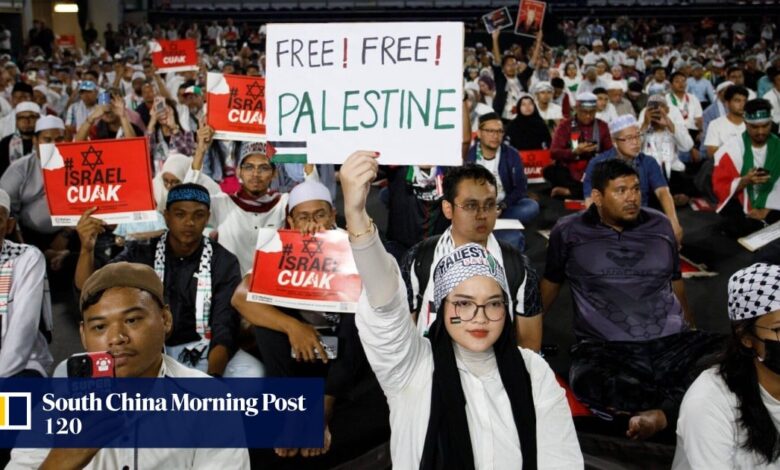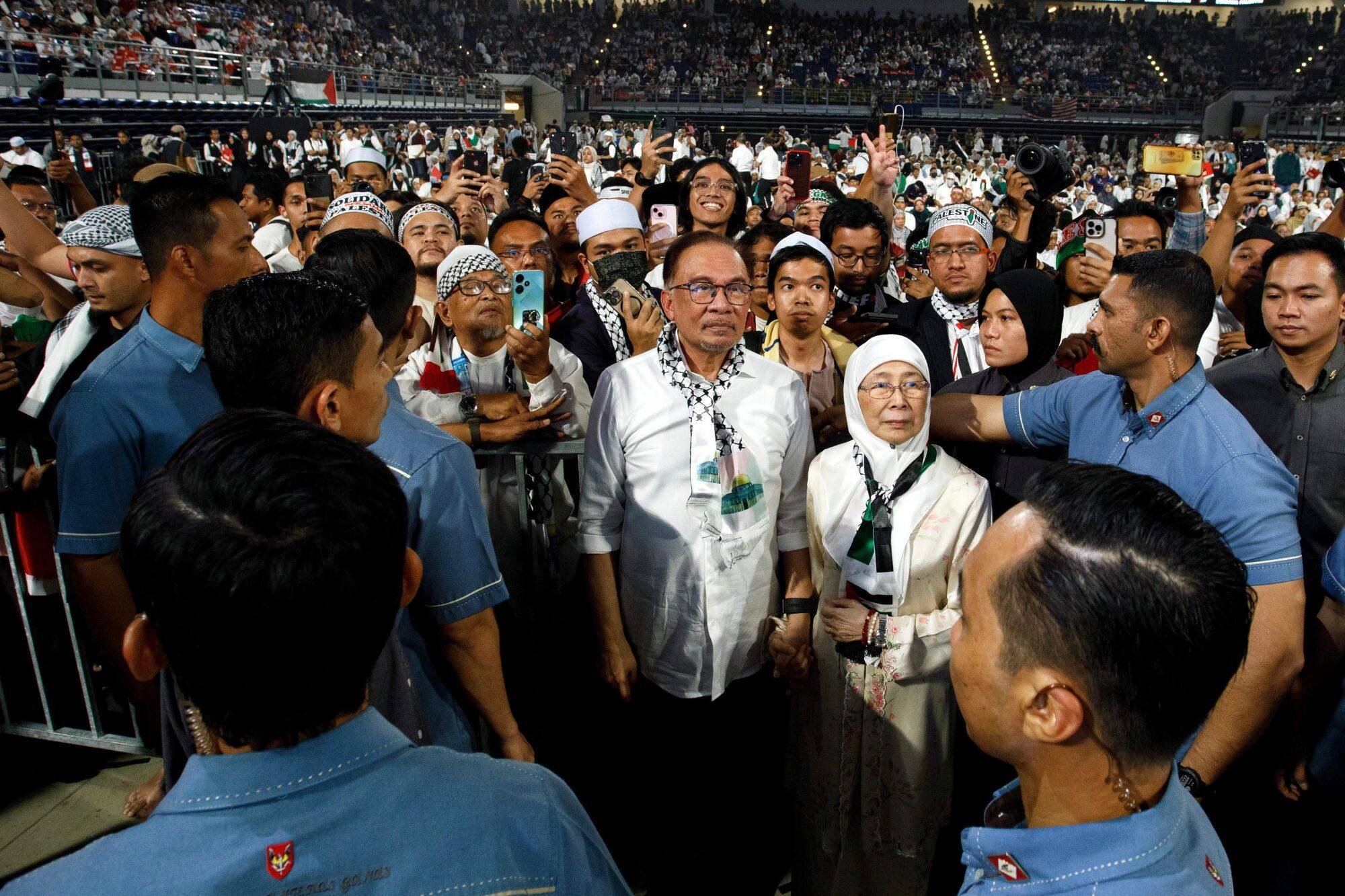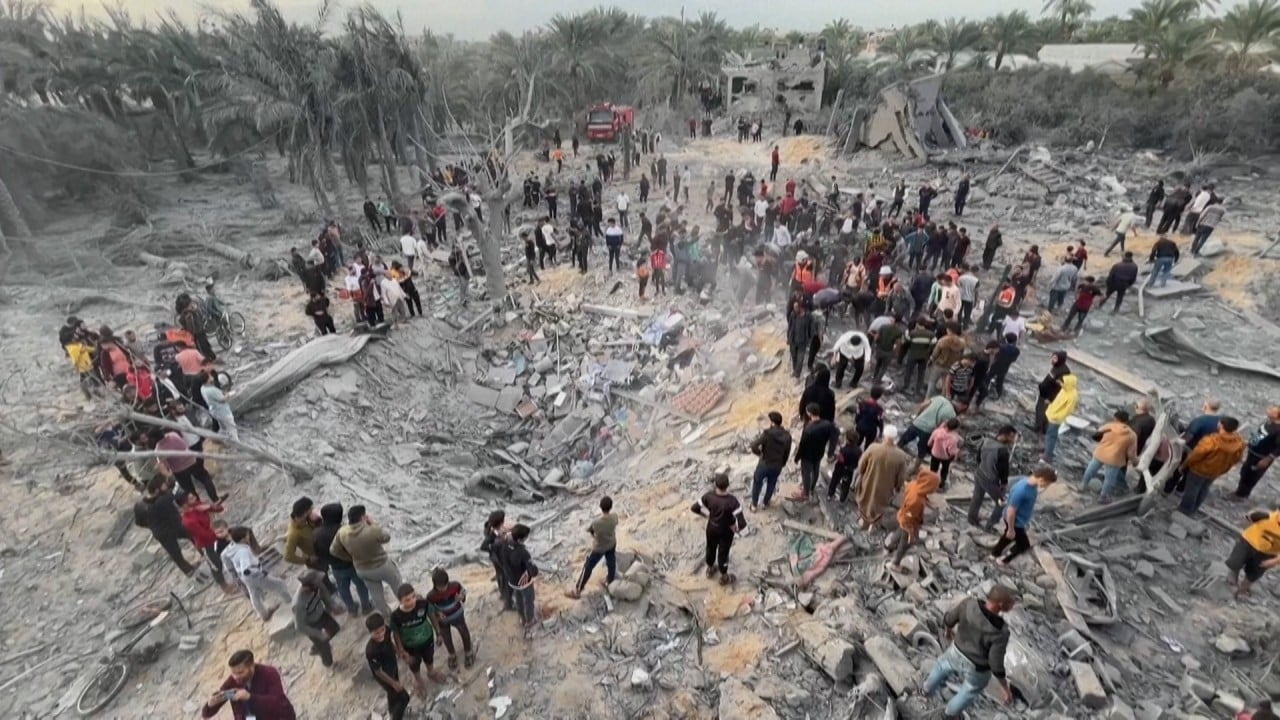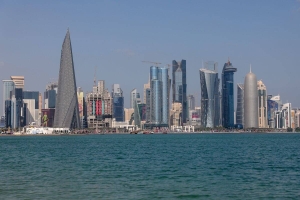Israel-Gaza war: in Singapore, a rare debate among elite emerges as concerned citizens tread a tightrope

[ad_1]
But even so, people are “quickly growing tired and restless of this narrative”, she said, pointing to how even rallies at a government-approved site are never going to get the official green light.
‘We’re siblings’: Malaysia, Singapore online users slam bid to stir row over Israel
‘We’re siblings’: Malaysia, Singapore online users slam bid to stir row over Israel
Others argue that keeping a tight lid on expressions of sympathy or anger is necessary to maintain the social fabric of a multiracial, multi-religious state, which has been carefully managed and maintained.
“I don’t think banning them is a great solution but neither is letting people go for rallies and protests a great idea too,” said 26-year-old Matthew*, another civil servant. “Because I think religion is not always rational, and it touches on an existential identity of an individual that is very easy for conflict to arise with facilitation.”
Matthew and Rebecca’s views illustrate the challenging balancing act the state has to strike between maintaining the republic’s hard-earned social cohesion and allowing its citizens to express and exchange views about the war.
Academics warn that people’s pent-up emotions may become a problem. “Control without outlets to voice concerns and even frustrations can also be cause for tension,” said Chong Ja Ian, political scientist from the National University of Singapore (NUS).
Perhaps recognising this, the establishment appears to be letting a diversity of views within its own ranks to show publicly – which is highly unusual for an elite that normally speaks with one voice.
Wong went at length to outline the country’s position and reiterated the government’s support for a two-state solution in the conflict, while calling on citizens to remain united against “divisive forces”.
“We are friends with both Israel and the Palestinians. But it doesn’t mean we support everything each side does. Instead, we consistently take a principled position, in line with international law and in support of global peace and security,” he said.
The government was among the first in the region to fiercely condemn Hamas’ terror attack on Israel but also urged that Israel’s response should not go against international law.
Malaysia pizza chain to rebrand as widening boycott over Israel-Gaza war bites
Malaysia pizza chain to rebrand as widening boycott over Israel-Gaza war bites
The republic maintains ties with the Palestinian Authority that governs the West Bank, and Foreign Minister Vivian Balakrishnan held talks with counterparts in Ramallah last year.
But pressure for the government to take on a different course of action has grown, with petitions to end diplomatic ties with Israel and invitations to covert gatherings circulating on social media.
Some have taken part in online campaigns such as the #weargreenforpalestine or taken photos of watermelon slices – which has emerged as a symbol of Palestine, as the fruit when cut bears the same colours as the flag – to skirt the rules. Virtual posters have also been passed around for a watermelon gathering but one has yet to materialise.
Differences of opinion within the foreign policy establishment were aired last week.

In an opinion piece published by the government-funded newspaper, The Straits Times, Bilahari Kausikan, a former diplomat and permanent secretary in Singapore’s foreign ministry, wrote that the restoration of deterrence “is an existential issue” for Israel and humanitarian law and the laws of war “take on a somewhat abstract quality as counsels of perfection”.
“Nevertheless, I think Israel, in order to retain the support of the US and key European countries, will respect humanitarian law and the laws of war to the extent that it is practical,” he wrote.
In response, Tommy Koh, another former diplomat and Ambassador-at-Large, wrote an op-ed disagreeing with Kausikan’s take on how Israel sees the need to comply with humanitarian laws and laws of war.
“The obligation by Israel to comply with both sets of laws is absolute, and not only when it is practical to do so,” said Koh, an international law expert by training.
Shortly after, Singapore’s legal supremo, K Shanmugam, the law minister, argued on his Facebook page that Kausikan’s op-ed failed to emphasise the illegal actions taken by the Israeli government, such as the establishment of settlements in the West Bank, which had hampered progress towards a two-state solution.
“The truth is that Israeli government actions have been contrary to international law, and oppressive to the Palestinians. One can say this while also accepting that parts of the Palestinian leadership has acted very badly, seeking the complete wipe out of Israel.”
‘Toxic’ narratives over Israel-Gaza war open deep divisions in the West
‘Toxic’ narratives over Israel-Gaza war open deep divisions in the West
To a former parliamentarian from the ruling People’s Action Party, these rare displays of debate if not outright disagreement among Singapore’s elite reflect how “torn” the government is in its stance.
“While as a country we have to condemn the terror attacks, we also cannot support innocent civilians being killed by a mass action by the Israeli military. Singapore has very close ties with Israel in many areas, it is now proving a challenge for Singapore to give wholesale support to Israel as they disregard the calls to stop the indiscriminate attack on civilians,” Inderjit Singh said.
Even though such differences of opinion would go unnoticed elsewhere, it is “highly unusual” for Singapore, where most issues tend to be “directed from the top down – at least in public”, Chong from NUS said.
“I think the different perspectives suggest some reflection of the variety of views in Singapore. It is important for Singaporeans to understand that others may see things differently and why,” he said.
As to whether the public airing of differences was a deliberate gesture, Singh would only point to an international dimension to the debate, given how Singapore had been viewed as “giving wholesale support” to Israel.
Singapore was not blind to the fact that the United States, for example, had come under heavy criticism for its unwillingness to urge for a ceasefire or to condemn Israel’s actions, he suggested.
In the two countries, anti-Israel boycott lists have been making their rounds on social media platforms for weeks amid fierce debate about conflating the Jewish people as a whole with the Israeli state.

Companies should avoid taking a “political-centric” position on the war, said Eugene Tan, a law professor at Singapore Management University. “It would be better for companies to carefully consider how they can make a positive difference while also exercising utmost care not to become embroiled.”
“The developments could affect Singapore’s internal situation, and the foremost consideration for Singapore’s authorities and companies and individuals is to maintain Singapore’s racial and religious harmony and that external events must not affect this fundamental attribute,” he added.
But boycotts in neighbouring countries have not had a spillover effect in Singapore just yet. “I think Singaporeans are more measured and pragmatic on such issues. Singaporeans have also seen that the government has been balanced and has criticised the overkill by the Israeli military, affecting so many innocent civilians,” said Singh.
Civil servant Rebecca says she accepts the situation but with a sense of unease. “There is an understanding that what is happening there is very viscerally affecting Singaporeans, but the government’s measures seem to minimise, or fail to recognise the depths to which Singaporeans are struggling with it,” she said.

Elvin Ong, an assistant professor in political science at NUS, conceded the debates in Singapore had been relatively subdued compared with countries elsewhere and attributed it to the government doing a “decent job” of providing some safe platforms.
He cited discussions organised by content creators and special prayers held in several mosques.
“By and large the government has struck a good balance, explaining Singapore’s position clearly in parliament, which Singaporeans understand as well,” he said.
While academics agreed that these rules help to ensure discussions are carefully managed, it may not be sustainable if the situation worsens.
Chong said: “At present, people who feel strongly may be willing to tolerate such limitations and the cost of controlling such expressions by the state are acceptable.
“Should tensions grow in the Middle East due to a significant deterioration of an already horrific situation, this calibration may become more challenging for all involved.”
* Names were changed at interviewees’ request.
[ad_2]
Source link






